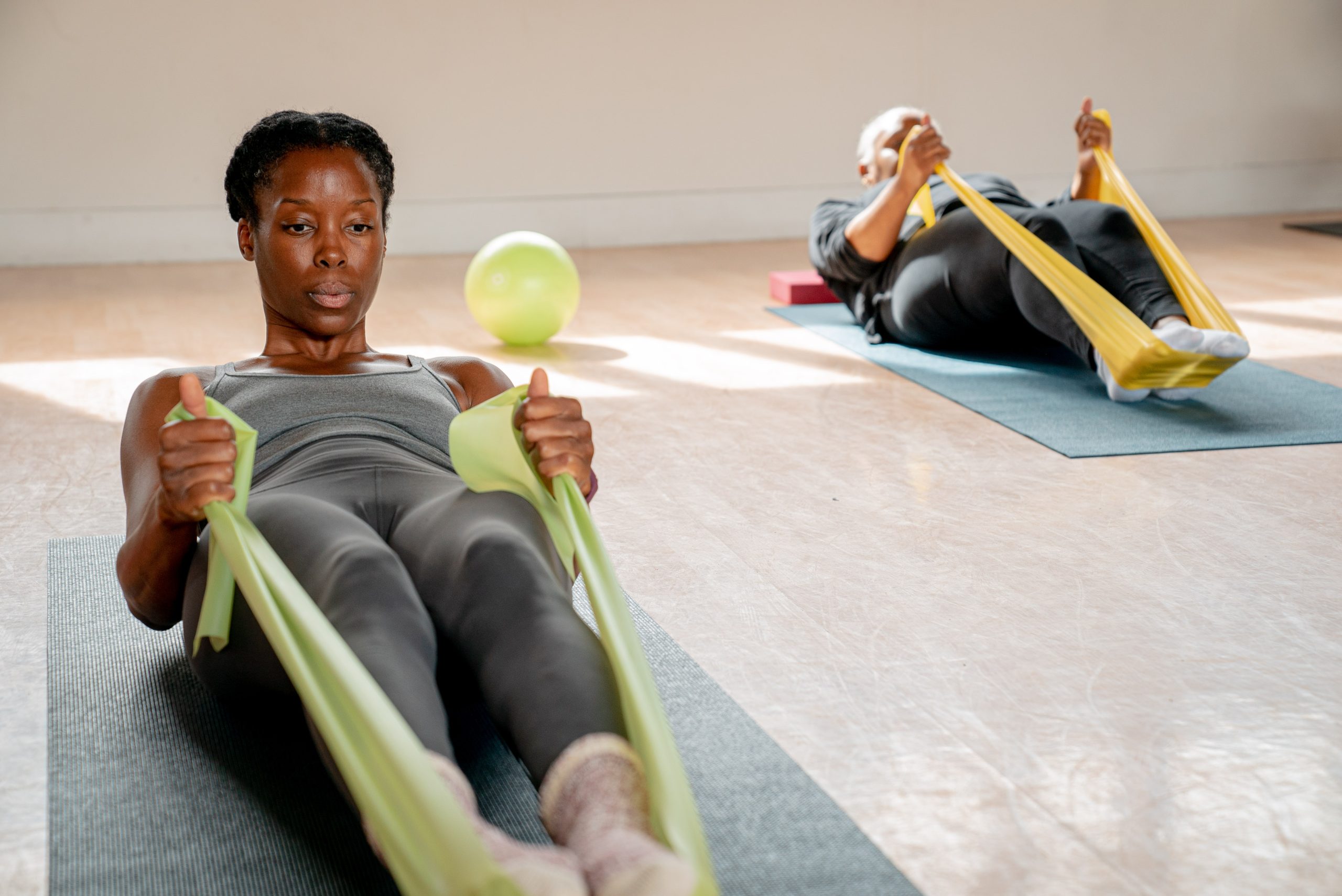Nutrition for Workouts | 10 Healthy Foods to Improve Athletic Performance
|
Nutrition and fitness go hand in hand. In fact, what you fuel your body with can have just as much impact on your overall fitness as the workouts you do! By incorporating the right foods, you can support your fitness journey with a range of benefits: more sustained energy, assistance with muscle recovery, improved blood flow, reduced inflammation, and encouraging muscle growth among others.
If you’re looking to get the most out of your workouts, here are 10 foods that you can incorporate into your weekly meal plan to help support your goals:
1. Bananas
Bananas are packed with potassium – an essential nutrient that helps you stay hydrated and reduces muscle cramps. They contain natural sugar for a quick energy boost, but they’re also made up of slow-releasing carbs, which will help with muscle recovery and replenishing your body’s glycogen stores post-workout.
Meal inspo:
- Bananas are excellent snacks on their own!
- Mix bananas into a smoothie with any combination of other fruits, nut butter, and protein powder.
- Slice over yogurt or oats.
- Put some natural peanut butter on whole grain bread and top with banana slices.
- Dip in dark chocolate and pop into the freezer for a tasty and healthy dessert.
2. Greek yogurt
Greek yogurt is a perfect trifecta that’s high in protein, calcium, and probiotics – all elements that are essential to your wellbeing. The protein helps with muscle growth and repair, calcium improves bone strength, and probiotics are healthy live bacteria that help to balance your gut health and boost immunity.
Meal inspo:
- Create a yogurt parfait with Greek yogurt, fruit, nuts, and organic granola.
- Mix into your smoothie or protein shake for extra creaminess.
- Make a healthy tzatziki dip to enjoy with cucumbers, carrots, and pitta bread.
- Pop into the freezer to create frozen yogurt for a healthy dessert.
3. Oats
If you’re serious about your fitness, oats are one of the best breakfasts you can have! They contain sustained, slow releasing carbs that your body will digest slowly to provide energy over a longer stretch of time with no energy crash. They’re packed full of fibre to keep you satiated for longer, which can help with weight management if fat loss is your goal. Oats are also high in plant protein to help with muscle recovery.
Meal inspo:
- Cook up some porridge and top it with fruit and nuts.
- Have a jar of overnight oats in your fridge for an on-the-go breakfast.
- Bake oats with dried fruit, nuts and seeds, coconut oil, and a drizzle of honey or maple syrup to make your own healthy homemade granola.
4. Avocados
Avocados are a creamy and delicious form of healthy monosaturated fat with a low glycaemic index, which is slow burning to sustain your energy levels and prevent a blood sugar crash. They also contain plenty of potassium to regulate blood pressure while you work out.
Meal inspo:
- Smash some avocado onto a slice of whole grain toast. Top with a poached egg for an extra protein hit!
- Enjoy slices of avocado on a salad or in a sandwich.
- Mix up a homemade guacamole or an avocado salsa with cubed tomato or mango. These are excellent as a dip, on tacos, or to top off a grain bowl!
5. Eggs
Eggs are little protein-packed powerhouses! They are considered a complete protein, which means they contain all 9 amino acids, which are vital to building muscle tissue and recovering after a tough workout. One of these amino acids is leucine, which helps your body with muscle protein synthesis. In addition to protein, eggs contain healthy fats for sustained energy.
Meal inspo:
- Cook your eggs in any style you like – scrambled, poached, boiled, as an omelette, or any other way you enjoy!
- Accompany your eggs with other healthy foods like whole grain toast, avocados, and vegetables.
- Mix egg into a stir-fry for some extra flavour and protein.
6. Berries
Berries are small but mighty! They’re loaded with antioxidants, which prevent free radical damage to muscle tissue and improve athletic performance by lowering blood pressure and cholesterol. Berries contain carbs for energy, high fibre for satiety and sustained energy, and a high water content to keep you hydrated.
Meal inspo:
- Sprinkle berries over yogurt, oats, or cereal for breakfast or add them to a salad for a healthy hit of antioxidants during lunch or dinner.
- Add a variety of mixed berries to a smoothie or enjoy on a smoothie bowl.
- Mix berries with other fruits to create a healthy and delicious fruit salad.
- Make your own homemade jam with raspberries, blackberries, strawberries, or any other type of berry.
- Coat berries in Greek yogurt, add a sprinkle of cacao, and pop into the freezer for a healthy snack.
7. Quinoa
Quinoa is a complete protein source, containing all 9 amino acids to assist with muscle repair and growth. It’s also high in iron and magnesium to help produce energy and reduce inflammation throughout the body. The high fibre content of quinoa helps keep you satiated and reduces spikes in blood pressure.
Meal inspo:
- Use quinoa as a base with any dish where you’d usually use rice, such as a curry, stir-fry, or salad bowl.
- Add quinoa to bulk up soups or stews.
- Enjoy as a side dish with vegetables and a source of protein like lean meat, fish, or tofu.
- Make stuffed vegetables, such as peppers, aubergine, or squash with quinoa as a filling.
- Have a savoury breakfast of quinoa topped with an egg or avocado.
8. Chia seeds
Chia seeds are tiny but mighty! They are an excellent source of omega-3 fatty acids, which help your body release energy slowly and steadily throughout the day. They also absorb water during digestion, helping you stay hydrated. Additionally, chia seeds are high in fibre for satiety, protein for muscle recovery (they’re complete proteins with all 9 amino acids!), and antioxidants to prevent inflammation.
Meal inspo:
- Mix chia seeds into your oats, yogurt, or smoothies.
- Add on top of toast – think of them like healthy sprinkles!
- Make a chia pudding by mixing chia seeds with the milk of your choice – almond and coconut work great!
- Mix together chia seeds and stewed berries to create your own chia jam.
9. Beetroot
This ruby red veg is rich in nitrates, which increase endurance, improve blood flow, and help the body use oxygen more efficiently. Adding beetroot into your diet is especially beneficial is endurance if one of your fitness goals, for example if you’re training for a long-distance run.
Meal inspo:
- Enjoy a glass of beetroot juice on its own.
- Add roasted or pickled beetroots to a salad or a grain bowl.
- Blend up some beetroot with chickpeas, olive oil, garlic, and tahini to make a delicious beetroot hummus.
- Blitz up a beetroot puree with water and honey, then pop into the freezer to make a delicious and natural beetroot sorbet.
10. Sweet potatoes
Sweet potatoes are complex carbs that break down slowly to give you long-lasting energy throughout the day. They are also high in fibre to assist with digestion and satiety, and they contain potassium to improve your body’s muscle functioning and reduce cramps.
Meal inspo:
- Add an extra nutrition boost to dishes like curries, soups, and stir-fries.
- Make some homemade sweet potato fries in the oven or air fryer as a healthier alternative to chips.
- Roast up a tray full of sweet potatoes and other vegetables and enjoy alongside the protein source of your choice.
These are just a handful of the healthy foods that you can add into your diet to support your health goals. But there are so many more out there as well – here are five honourable mentions that we couldn’t leave out:
- Mixed nuts, such as almonds, cashews, and pistachios
- Leafy greens like spinach and kale
- All whole grains – we already mentioned oats and quinoa but bulgar wheat, brown rice, and pearl barley are some other favourites!
- Lean protein sources like beans, fish, chicken, and tofu
- Essentially all fruits and vegetables – the more the better!
Whether your fitness goals are focused on fat loss, muscle gain, improved flexibility, or better overall wellbeing, it’s important to find the right balance of nutrients that works for your body. Everyone’s needs are different, so take some time to adjust your intake of carbs, proteins, and fats based on how you feel, perform, and recover. Pay attention to your energy levels, mood, and progress over time. This will help you fine-tune your nutrition in a way that supports your goals more effectively. And as always, be mindful of any food allergies or sensitivities. Take note of how your body responds when trying something new, and adjust accordingly.
If you’re fascinated with nutrition and would like to learn more about the connection between fitness and nutrition (or you’d love to offer this service to your personal training clients), we have recently launched a diploma in nutrition. Throughout the course, you’ll learn about different ways you can adjust your diet to improve athletic performance. Click here to learn more.





